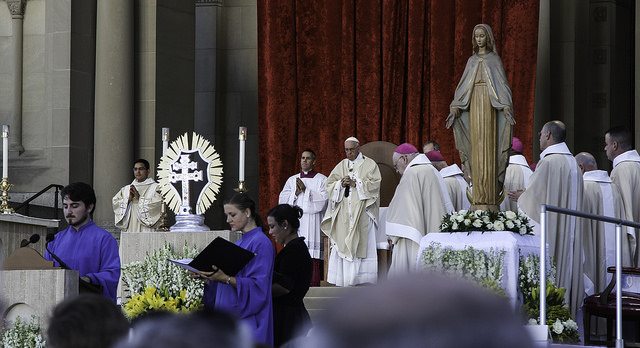Pope Francis’ September visit made headlines and history as the first papal visit to America to include an address to a joint meeting of Congress. His comments during the United States visit often focused on poverty and placed an imperative on church and government alike to help disadvantaged members of society.
I had the privilege of witnessing one such address when I attended the Holy Mass and Canonization of Blessed Friar Junipero Serra at Catholic University on Sept. 24. Because I am not Catholic and had been to only a few masses, it was an eye-opening experience.
My ticket was for a standing-only section located on the side of the Basilica where we watched the mass on a large screen. Most of the other ticketholders in my section were Catholics who had won tickets by lottery. Large buses stopped on the asphalt drive between us and the screen. As cardinals stepped out of the buses, the people around me cheered and waved as they picked out their cardinal.
The Hispanic Catholic community was particularly prominent in my area, and as the pope’s motorcade flashed across the screen, many of them shouted “Papa Francisco!” in anticipation. Standing in his white popemobile, Francis smiled and waved past the 2,500-person crowd assembled for the mass. Our section was on tiptoe, hoping for a glimpse of his head and shoulders above the crowd.
As the mass proceeded, I was unfamiliar with many of the traditions used. This, combined with my rudimentary knowledge of Spanish—Pope Francis’ native Argentinian tongue—made the mass difficult to comprehend at times. While the Spanish-speakers around me were particularly attuned to the service, the mass included languages from around the world. Once “universal prayer” contained sentences spoken in everything from Creole to Tagalog to American Sign Language. There were also English subtitles on the screen throughout most of the mass.
In Pope Francis’ homily, he honored 18th-century friar Junípero Serra, who was canonized during the mass. Francis said that Serra was a Catholic leader who “was excited about blazing trails, going forth to meet many people, learning and valuing their particular customs and ways of life,” and he encouraged modern-day Christians to follow that example.
“Jesus did not provide a short list of who is, or is not, worthy of receiving his message and his presence,” Francis said. “Instead, he always embraced life as he saw it. In faces of pain, hunger, sickness and sin. In faces of wounds, of thirst, of weariness, doubt and pity. Far from expecting a pretty life, smartly-dressed and neatly groomed, he embraced life as he found it. It made no difference whether it was dirty, unkempt, broken.”
This homily marked a theme in the pope’s rhetoric that continued throughout his visit. The following day, he spoke and shared lunch with the homeless community at St. Patrick’s church, also the headquarters of Catholic Charities.
“We can find no social or moral justification, no justification whatsoever, for lack of housing,” he said to the group.
The pope also paid a visit to Curran-Fromhold Correctional Facility in Philadelphia and spoke out against mass incarceration in the United States, which was a key component of Catholic Charities’ Walk With Francis pledge campaign. In reaction to his words on criminal justice, a prayer vigil formed outside of Men’s Central Jail in Los Angeles on September 29.
Throughout his visit, Francis’ soft voice managed to be heard by millions. As more facts of the visit become known, that voice becomes one neither Republicans nor Democrats are able to perfectly mold to their agenda. While praised by Democrats for his inclusive rhetoric during his visit, he has garnered criticism this week for reports that he met with Kim Davis, the Kentucky county clerk who refused to issue same-sex marriage licenses. Francis told her to “stay strong.” (The Vatican has said she was one guest in a group meeting, though Davis’s lawyers say differently). Meanwhile, Republicans’ appreciation of his support for the anti-choice movement and traditional marriage was tempered by his effort to give these issues only vague coverage while here, favoring environmental and immigration issues instead.
Perhaps it was because Pope Francis did not universally embrace the agendas of either party that his visit brought a brief sense of unity to D.C. and the other cities he visited, which, in all their diversity, occasionally need an outsider to bring them together. Regardless of the dissent that may naturally begin to emerge among parties in Francis’ wake, the homeless community can count his visit as a victory, especially if Francis’ challenge of compassion is taken to heart.
“Go out to proclaim the good news that error, deceitful illusions and falsehoods do not have the last word in a person’s life,” he said in his homily. “Go out with the ointment which soothes wounds and heals hearts.”








